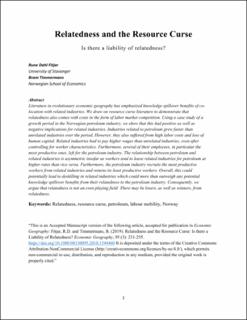| dc.contributor.author | Fitjar, Rune Dahl | |
| dc.contributor.author | Timmermans, Bram | |
| dc.date.accessioned | 2022-01-07T12:22:20Z | |
| dc.date.available | 2022-01-07T12:22:20Z | |
| dc.date.created | 2019-05-20T17:28:20Z | |
| dc.date.issued | 2019 | |
| dc.identifier.citation | Fitjar, R.D., Timmermans, B. (2019) Relatedness and the resource curse: Is there a liability of relatedness?. Economic Geography, 95 (3), 231-255. | en_US |
| dc.identifier.issn | 0013-0095 | |
| dc.identifier.uri | https://hdl.handle.net/11250/2836501 | |
| dc.description | This is an Accepted Manuscript of an article published by Taylor & Francis in ECONOMIC GEOGRAPHY on 24 Jan 2019, available online: http://www.tandfonline.com/10.1080/00130095.2018.1544460. | en_US |
| dc.description.abstract | Literature in evolutionary economic geography has emphasized knowledge spillover benefits of co-location with related industries. We draw on resource curse literature to demonstrate that relatedness also comes with costs in the form of labor market competition. Using a case study of a growth period in the Norwegian petroleum industry, we show that this had positive as well as negative implications for related industries. Industries related to petroleum grew faster than unrelated industries over the period. However, they also suffered from high labor costs and loss of human capital. Related industries had to pay higher wages than unrelated industries, even after controlling for worker characteristics. Furthermore, several of their employees, in particular the most productive ones, left for the petroleum industry. The relationship between petroleum and related industries is asymmetric insofar as workers tend to leave related industries for petroleum at higher rates than vice versa. Furthermore, the petroleum industry recruits the most productive workers from related industries and returns its least productive workers. Overall, this could potentially lead to de-skilling in related industries, which could more than outweigh any potential knowledge spillover benefits from their relatedness to the petroleum industry. Consequently, we argue that relatedness is not an even playing field: there may be losers, as well as winners, from relatedness. | en_US |
| dc.language.iso | eng | en_US |
| dc.publisher | Informa UK Ltd. (Taylor & Francis) | en_US |
| dc.relation.uri | https://www.tandfonline.com/doi/full/10.1080/00130095.2018.1544460 | |
| dc.subject | økonomisk geografi | en_US |
| dc.subject | petroleumsnæringen | en_US |
| dc.subject | oljeindustrien | en_US |
| dc.subject | arbeidsmobilitet | en_US |
| dc.title | Relatedness and the resource curse: Is there a liability of relatedness? | en_US |
| dc.type | Peer reviewed | en_US |
| dc.type | Journal article | en_US |
| dc.description.version | acceptedVersion | en_US |
| dc.rights.holder | © Informa UK Ltd. | en_US |
| dc.subject.nsi | VDP::Samfunnsvitenskap: 200::Økonomi: 210 | en_US |
| dc.source.pagenumber | 231-255 | en_US |
| dc.source.volume | 95 | en_US |
| dc.source.journal | Economic Geography | en_US |
| dc.source.issue | 3 | en_US |
| dc.identifier.doi | 10.1080/00130095.2018.1544460 | |
| dc.identifier.cristin | 1698902 | |
| dc.relation.project | Norges forskningsråd: 209761 | en_US |
| dc.relation.project | Norges forskningsråd: 233737 | en_US |
| cristin.ispublished | true | |
| cristin.fulltext | original | |
| cristin.fulltext | postprint | |
| cristin.qualitycode | 2 | |
